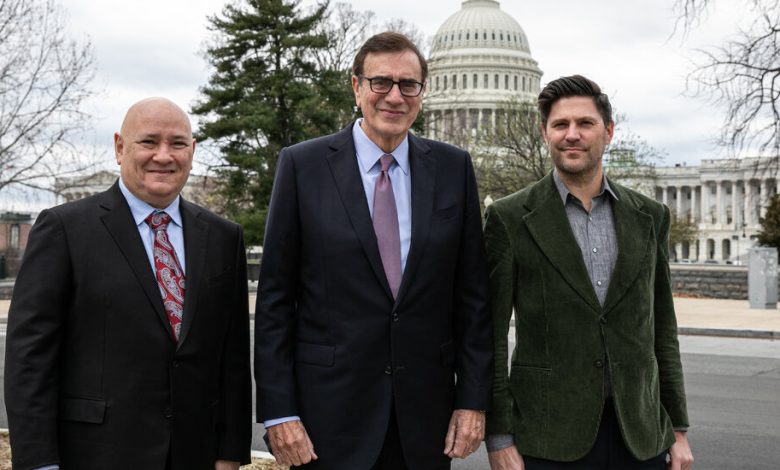The Messenger, a Media Start-Up, Aims to Build a Newsroom Fast

Jimmy Finkelstein’s winding career in publishing has included running and being a part-owner of The Hollywood Reporter and The Hill, a middle-market chronicler of Washington politics. In 2021, he sold The Hill to the broadcast giant Nexstar for $130 million.
But neither of those journalistic ventures was nearly as big as what Mr. Finkelstein, 74, is envisioning for what he’s calling his last major act in the media industry.
In May, he plans to introduce The Messenger, a news site that will cover politics, business, entertainment and sports. Financed with $50 million in investor money, the site will start with at least 175 journalists stationed in New York, Washington and Los Angeles, executives say. But in a year, Mr. Finkelstein said, he plans to have around 550 journalists, about as many as The Los Angeles Times.
The goal, Mr. Finkelstein said in his first extended interview about the new business, is creating an alternative to a national news media that he says has come under the sway of partisan influences. The site will be free and supported by advertising, with an events business to follow.
“I remember an era where you’d sit by the TV, when I was a kid with my family, and we’d all watch ‘60 Minutes’ together,” said Mr. Finkelstein, who comes from a wealthy New York publishing family. “Or we all couldn’t wait to get the next issue of Vanity Fair or whatever other magazine you were interested in. Those days are over, and the fact is, I want to help bring those days back.”
Inside the Media Industry
- The Cost of a Movie Seat: As the film business changes rapidly, multiplexes are experimenting with pricing in ways that may seem shocking to theatergoers.
- Rupert Murdoch: The conservative media mogul acknowledged in a deposition in a $1.6 billion defamation lawsuit that several Fox News hosts promoted the false narrative that the 2020 election was stolen.
- Dropping ‘Dilbert’: Hundreds of newspapers across the country will stop running the comic strip after its creator, Scott Adams, said that Black people were “a hate group.”
- Carlos Watson: The founder of the troubled digital start-up Ozy Media was arrested on fraud charges, punctuating one of the more precipitous falls in the annals of online journalism.
Mr. Finkelstein cited what he described as CNN’s limited coverage of the southern U.S. border and Fox News’s downplaying of the Capitol riot as the type of coverage he would like to address.
“I find that bias in the news is not so much what the people report, but what they don’t report,” he said. “So it’s really a question of not commission, but omission.”
Under his leadership, The Hill was accused of bias itself — as a conduit for conspiracy theories about Ukraine and President Biden’s family that were seized upon by former President Donald J. Trump. The Hill published a lengthy review of some of its work on the topic and added editor’s notes to many of its columns, noting that some failed to provide important details about sources and may have left readers unsure of whether the work was news reporting or opinion writing.
Mr. Finkelstein acknowledged that he and Mr. Trump had known each other socially for decades, adding that he’s friendly with Democrats, too. And he defended The Hill, saying independent studies determined that readers think the publication is “balanced and nonpartisan.”
Dan Wakeford, a former top editor of People Magazine, will oversee the newsroom. Mr. Wakeford has hired Marty Kady, a longtime senior editor at Politico, to be The Messenger’s politics editor, and Mary Margaret, a former top editor of Entertainment Weekly, to direct entertainment coverage.
Mr. Wakeford said The Messenger would explore many sides of an issue — “polyperspectivity,” he said — and wouldn’t ignore any perspectives or opinions.
Mr. Finkelstein’s backers include Josh Harris, co-founder of the private-equity giant Apollo; James Tisch, chief executive of the financial conglomerate Loews; and Thomas Peterffy, founder and chairman of the trading platform Interactive Brokers. Mr. Harris owned the majority of The Hill, according to two people familiar with the matter.
The Messenger will be starting during a difficult ad market. Media companies like The Washington Post, News Corp and Vox Media have all cut staff in the last year, some citing a fall in advertising revenue.
Richard Beckman, a former president of The Hill and Condé Nast who will be The Messenger’s president, said in an interview that the company planned to generate more than $100 million in revenue next year, primarily through advertising and events, with profitability expected that year.
To build its digital audience, the company has hired Neetzan Zimmerman, who has been a digital traffic maven at The Hill and Gawker Media, and is expecting more than 100 million monthly readers — an ambitious goal that would make it one of the most-read digital publications in the United States.
In the interview, Mr. Beckman pitched The Messenger with a sizzle reel featuring the Dire Straits hit “Money for Nothing,” saying he hoped the publication’s colorful writing, compelling visuals and in-depth reporting would make its audience “fall in love” with media again.
Mr. Finkelstein said starting The Messenger wasn’t his first idea after selling The Hill. He also tried to buy The Miami Herald, banking on Florida as an increasingly important state. But McClatchy, which owns the newspaper, wasn’t interested in selling to him.
“I really want to do something that changes journalism a bit and changes America for the good,” he said.




